Search Results for Tag: Warming
Arctic sea ice low as UN delegates talk climate in a sweltering Bonn.
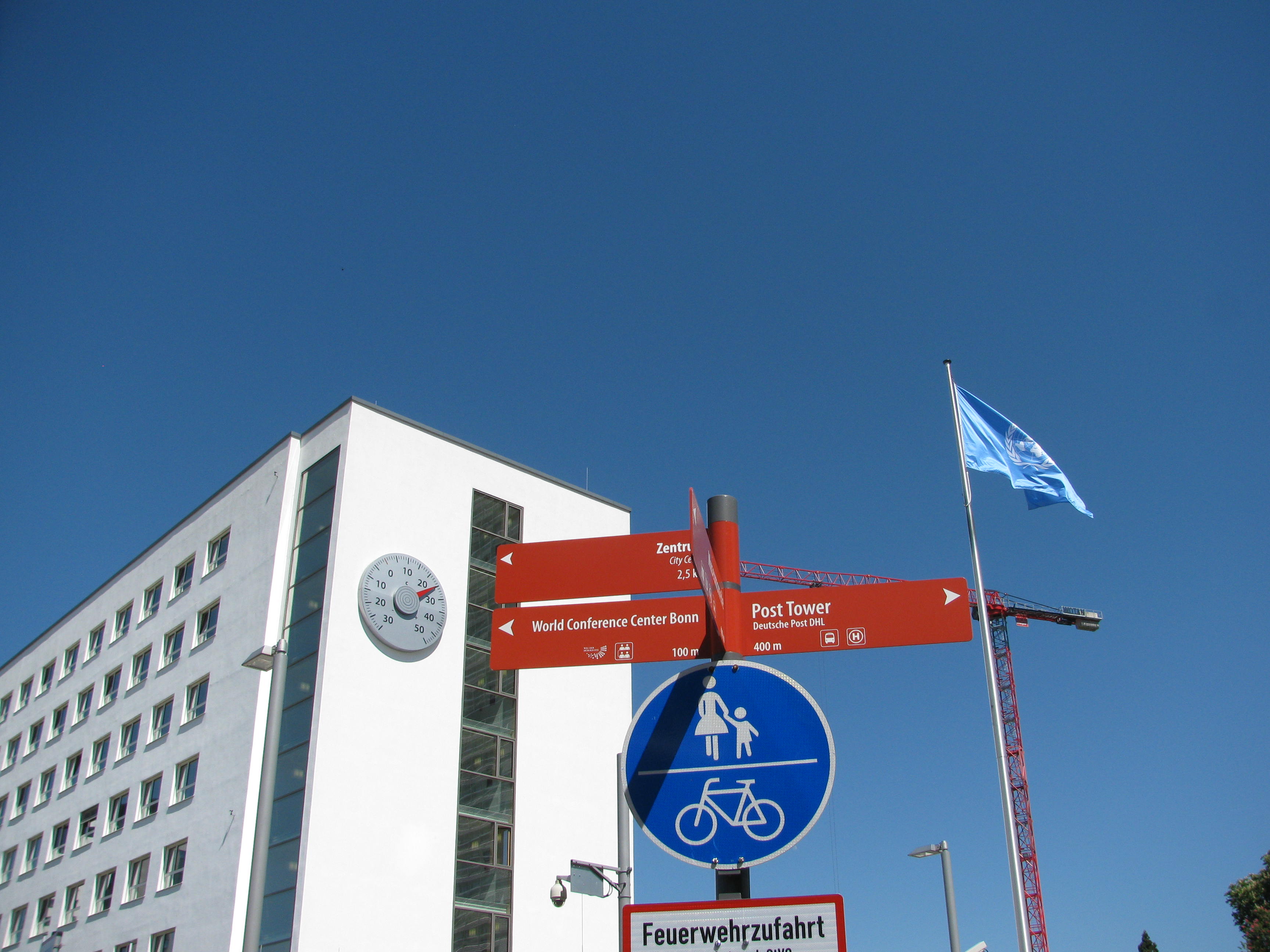
Blue skies, temperature rising at UN climate headquarters in Bonn
It’s been a scorcher of a week here in Bonn. Delegates to the UNFCCC climate talks (one of the interim meetings to prepare the big COP24 which will take place in Katowice, Poland, in December) have been experiencing non-stop sunshine and temperatures up to 30 degrees Celsius. It feels like the height of summer here, although we are only at the beginning of May.
How appropriate as a backdrop to a meeting that is trying to work out the nitty gritty of actually fulfilling the Paris Agreement commitment to limiting global warming to 2 or preferably 1.5 degrees C warming.
“Currently we’re heading for 3 degrees C of warming rather than the 1.5 degrees C agreed in Paris, and the window of opportunity to reverse this is swiftly closing,” was the comment from Jens Mattias Clausen from Greenpeace Nordic.
Sea ice on the wane (again)
Coming back to work after a long break, a catch-up look at twitter, #Arctic drew my attention first to a tweet from @ArthurWyns telling me “next week it will be 20°C warmer than usual on the #Arctic!!!”
Then came one from @ketil_Isaksen, about one of my own favourite Arctic places:
“Unusually early, extensive and rapid snow melt on #Svalbard releasing extreme melt water discharges in the valleys. +6°C and strong breeze today in #Longyearbyen (78°N)”
In Arctic Today, Yereth Rosen has an article telling us this year’s Arctic sea ice melt season is “off to an unusually fast start”, and provides some worrying data from the NSIDC.

Melting ice off Svalbard (Pic I.Quaile)
Still working out the rules
Given all this, I can well understand why a lot of people involved in the talks in Bonn are feeling frustrated at the slow progress being made.
The delegates are charged with finalizing the rules for the actual implementation of the Paris Agreement. You can be forgiven if you thought things had already moved beyond that stage.
Yes, the wheels of international climate diplomacy move very slowly.
At a press briefing organized by the Climate Action Network (CAN), Li Shuo, a Senior Climate & Energy Policy Officer with Greenpeace stressed: “This is a mini Paris here. We really are trying to finalize all the detailed rules for the Paris Agreement. That’s a daunting task.”
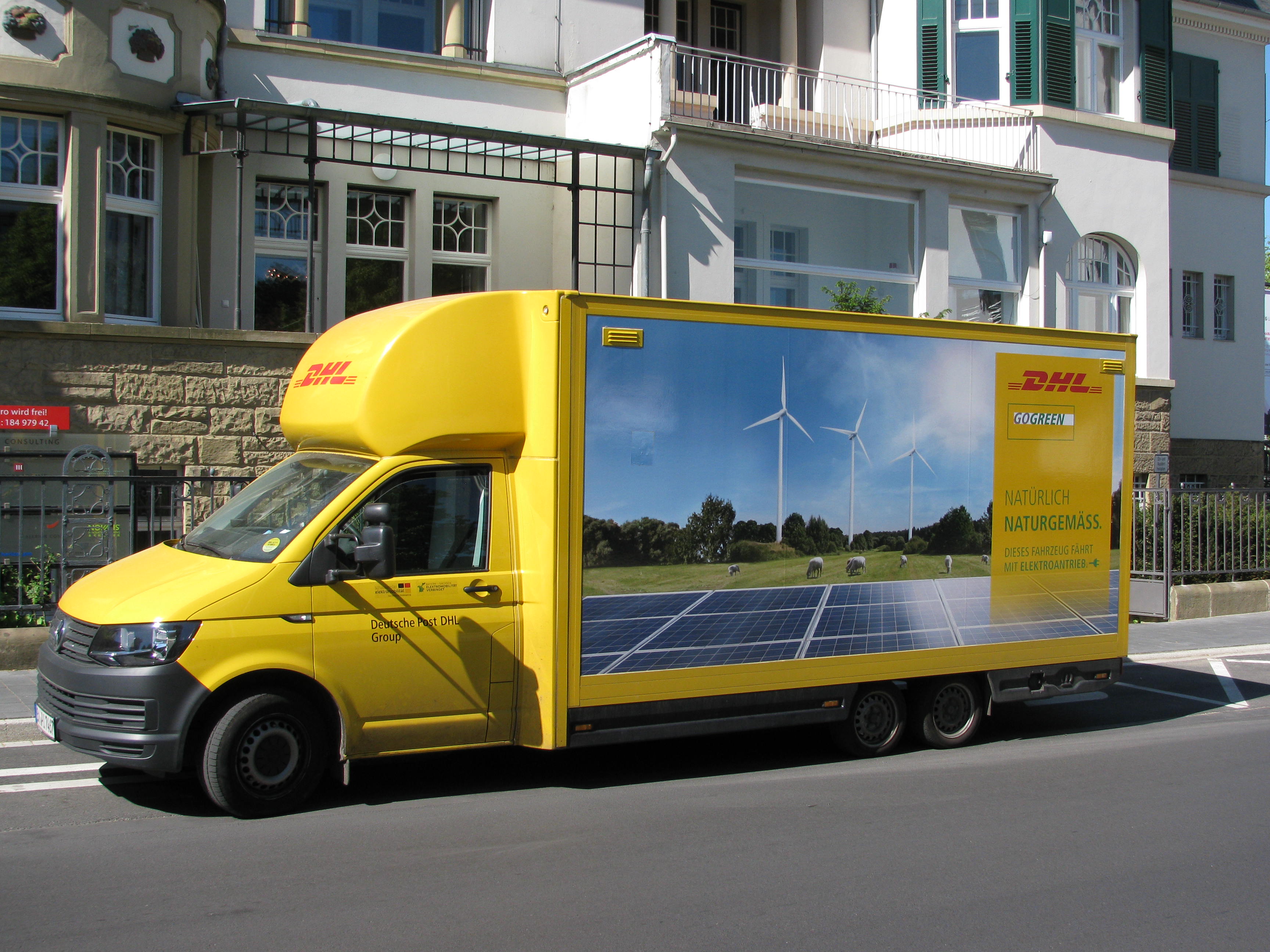
Climate-friendly electric lorry in Bonn (assuming it’s not running on coal-powered electricity?) (I.Quaile)
The Polish dilemma
The next COP at the end of this year will be held in Katowice, the heartland of Poland’s coal industry. Wouldn’t it be fantastic if that turned out to be a turning point in the transition away from fossil fuels to renewable, climate-friendly forms of energy? The city itself says it wants to go green, as one of our correspondents reported in the latest edition of my radio show Living Planet. But, alas. There are absolutely no signs that the Polish government is planning to change its policy any time soon.
“We have seen worrying signs that the Polish presidency thinks that it will sufficient just to get some kind of rulebook,” said Alden Meyer, Director of strategy and policy for the Union of Concerned Scientists, also at the event organized by CAN.
He went on: “We don’t have to wait for the IPCC special report in October to know that what’s on the table and being implemented falls far short of what’s needed to reach the temperature goals countries agreed to in Paris.”
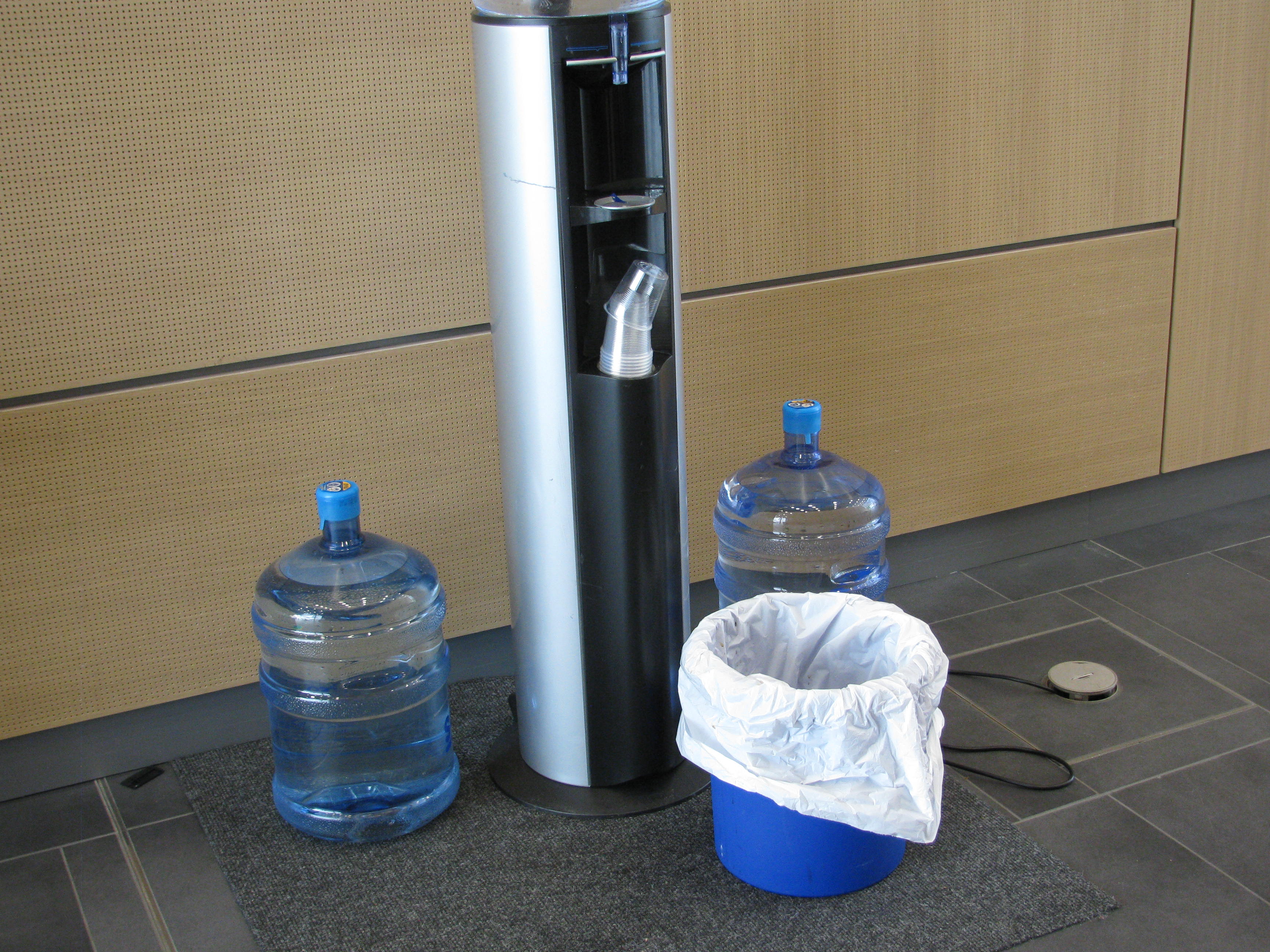
PLASTIC bottles, plastic cups for water? Yes, at the UN climate conference. (I.Quaile)
Coal and climate
I asked him how he saw Poland’s stance on all this at the moment. In spite of the government’s support for coal and reluctance to see to see the EU step up its goals, he stressed that “the role of the presidency is to put their domestic considerations aside and operate on behalf of the entire world community”.
Well, we can try to be optimistic.
“We retain some hope that Poland in its role as the presidency will be different from Poland in its role within the European Union and in its domestic energy policies”, said Meyer, they have to ensure that “the first review of the Paris Agreement, actually triggers much stronger climate commitments”.
Li Shuo noted that Poland was rather late in “shaping up their team” for the climate conference.
“There’s really no clarity from the incoming Polish presidency on how they plan to deal with the political process at Katowice. So we need to hear more from Poland”, he told me at our meeting.
The state of play
When I hear after a week and a half of a two-week working meeting that some progress has been made on technical issues of implementing the rules of the climate agreement, it does not make me feel confident that the international community is going to meet the emissions targets on time. “Other discussions are really stuck because of political differences”, said Li Shuo – mostly relating to the INDCs, or “nationally determined contributions”.
Concerned scientists’ representative Meyer reiterated the urgent need for progress on adaptation, with a lot of climate impacts already being felt: “No matter how successful we are on meeting the Paris temperature limitation goals, those impacts are going to continue to mount over the next several decades because of inertia and momentum in the climate system”.
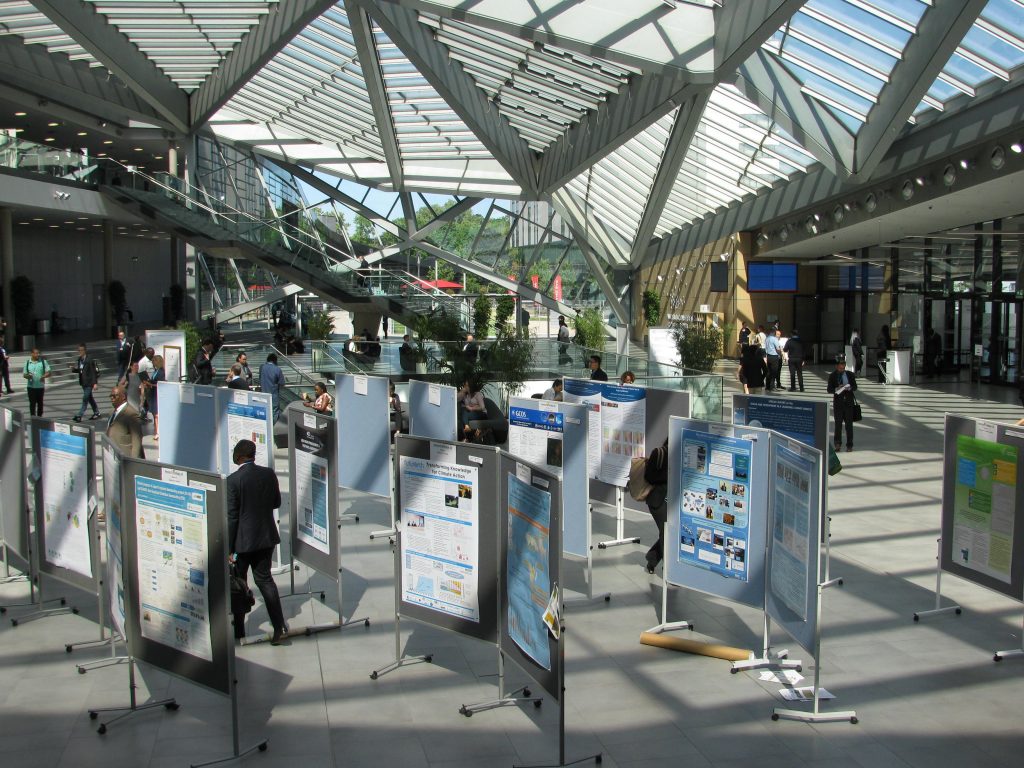
A maze of science! Good to see it at the Bonn gathering. (i.Quaile)
What happens in the Arctic…
That would also apply to the Arctic region, where temperature rise is not only completely altering things for people and nature up there – it is also changing weather patterns and ocean circulation, with severe implications for the whole planet.
“What is missing is leadership and guidance, especially coming from the presidency”, said Li Shuo. And the spectre of another President is also hovering over the Bonn talks.
However, the Polish government has been preparing for the end-of-year climate extravaganza in other ways. It has passed a bill specifically for the UN summit which bans all “spontaneous gatherings” in the southern coal-mining city of Katowice between November 26 and December 16, which covers the entire period of the conference. It also submits registered participants to government surveillance and allows authorities and police to obtain, collect and use personal data of attendees without their consent or judicial oversight.
We’re still trying to get an official UNFCCC statement on that one. Good ground for getting the whole world on board to halt climate change?
Iceblogger Images

Equi glacier meeting the sea off Greeenland (Pic. I.Quaile)
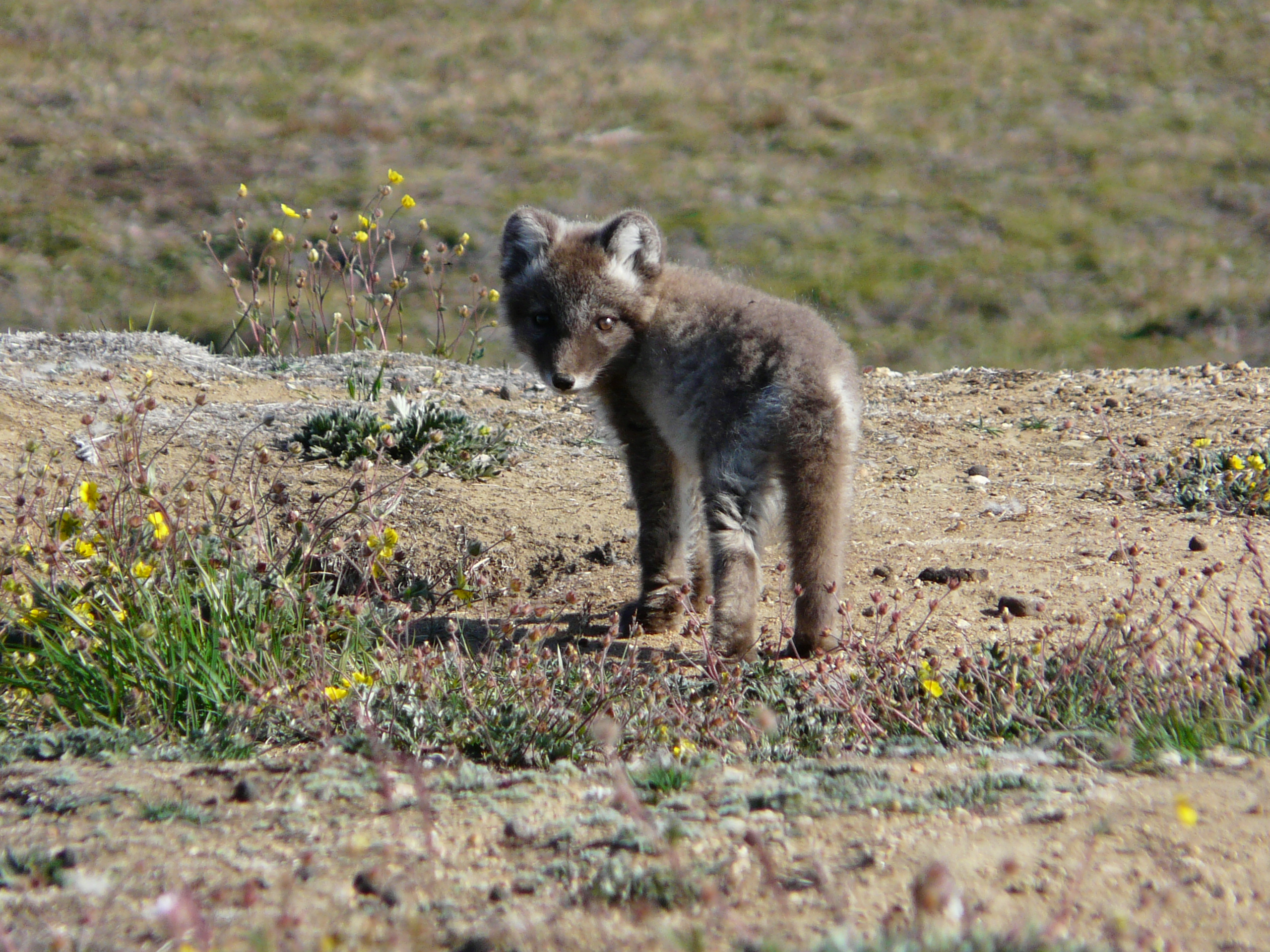
Will the Arctic fox survive in a warming climate? (Pic. I.Quaile, Greenland)

Iceblocker! (Pic. I.Quaile, Alaska)

Glimpse of Greenland (Pic. I.Quaile, Greenland)

Can we halt Arctic ice melt? (Pic: I.Quaile, Greenland)

Visit to the site of a lost Inupiat village at Point Barrow (Pic.: I.Quaile)
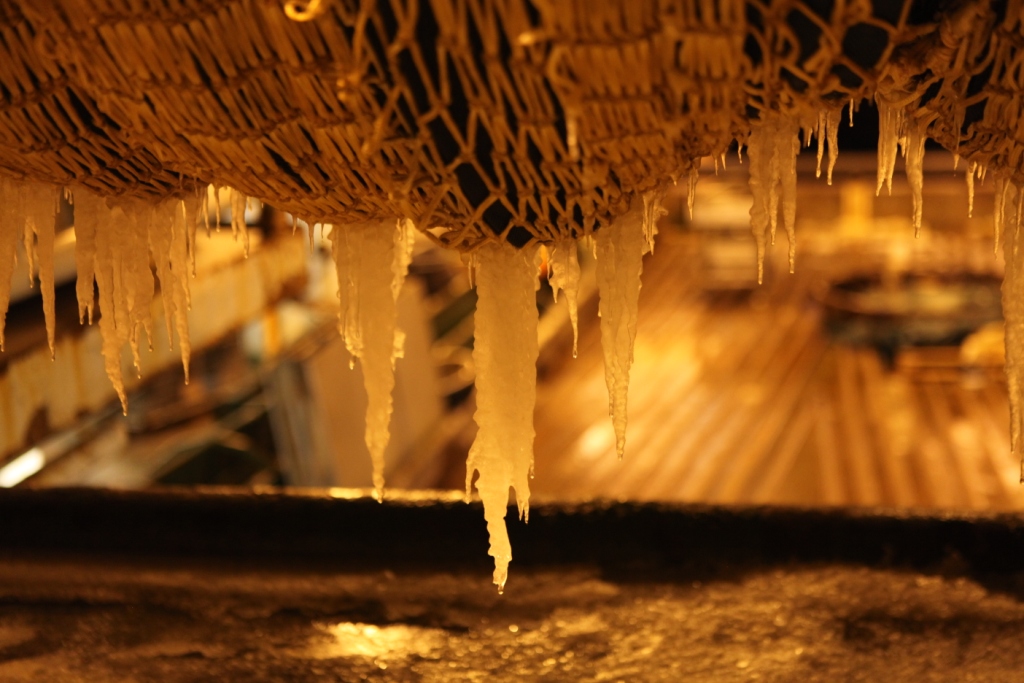
Icicles on the nets (Svalbard in winter)(Pic. I.Quaile)
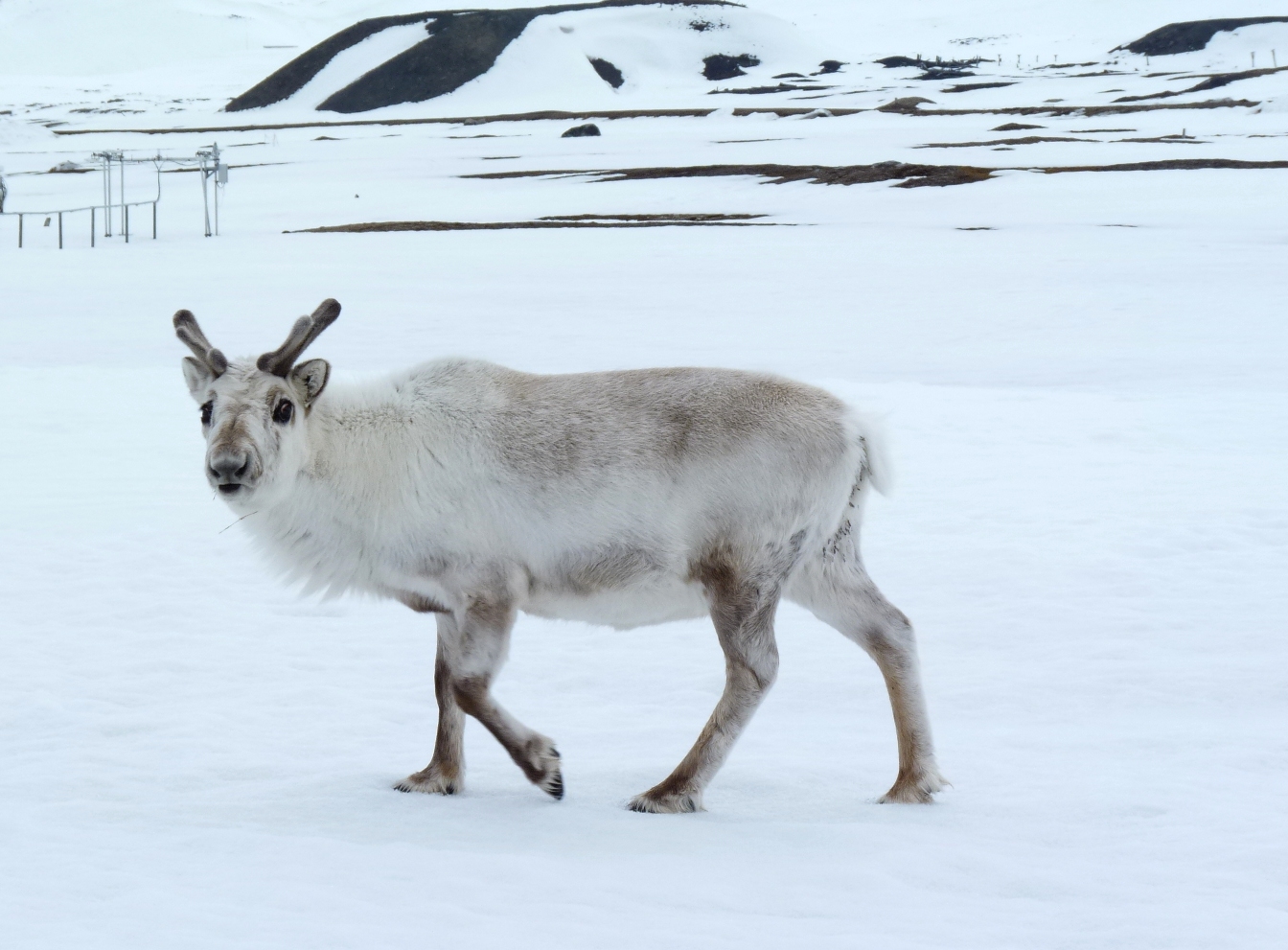
Svalbard’s sturdy reindeer are adapting to climate change. (Pic: I.Quaile)
Why Africa has to worry about melting Greenland ice

Equi glacier discharging into the sea off Greeenland (Pic. I.Quaile)
Working for an international broadcaster which has Africa as one of its key target groups, I often find it difficult to interest some of my colleagues in what is happening in the Arctic. So my attention was caught instantly when I came across an article by Chelsea Harvey in the Washington Post: A climate chain reaction: Major Greenland melting could devastate crops in Africa.
![]() read more
read more
Trump’s alternative reality? No warming, cool oceans, intact coral

Melting or not? (I.Quaile, Greenland)
“Irene, have you heard the news? Looks like Trump has pulled out of the Paris Agreement.” While the US President kept the suspense up until Thursday night – has he, hasn’t he, will he, won’t he -I struggled to reconcile his action with what I was hearing from a wide spectrum of highly intelligent people with decades of research and experience to their credit.
I was in Kiel this week, on Germany’s Baltic coast, attending a working meeting of the scientists involved in BIOACID, a national German programme (supported by the BMBF, Federal Ministry of Education and Research) to investigate the “Biological Impacts of Ocean Acidification”. It has almost run its course, eight years of research in the bag.
And what I was hearing did nothing to allay my concern about the impacts of our greenhouse gas emissions. We are rapidly and undeniably changing the planet we live on – land and sea. And that applies particularly to the Arctic.

GEOMAR’s research vessel Alkor in Kiel getting ready for her next trip (Pic:.I.Quaile)
The scientific evidence
Can President Trump really fail to see the dangers of our human interference? Is he really oblivious to what climate change is doing to the ocean that covers 70 percent of the surface of our planet?
Maybe he lives in a parallel universe, where alternative facts prevail.
Back in 2010, I was able to witness the work of some of the scientists assembled in Kiel this week at first hand, as they lowered mesocosms, a kind of giant test tubes, into the Arctic Ocean off the coast of Svalbard. The aim was to find out how the life forms in the water would react to increasing acidification of their environment, as our greenhouse gas emissions result in more and more CO2 being absorbed into the ocean.
Drawing the threads together

Ulf Riebesell with team members deploying experiments at Svalbard (Pic.I.Quaile)
Ulf Riebesell is Professor of Professor of Biological Oceanography at, GEOMAR, the Helmholtz Centre for Ocean Research in Kiel, and the coordinator of BIOACID.
When I first met him, he was kitted out in survival gear, supervising the transport and deployment of the mesocosms from Germany up to the Svalbard archipelago. He doesn’t need the cold-weather gear this week, in a summery Kiel, where he gathered representatives of the different working groups involved in the German project to draw some threads together as the project approaches its conclusion in November.
Good timing. The results will be ready to hand to the delegates attending this year’s UN climate extravaganza, COP23, in Bonn. Another key piece in the jigsaw puzzle of how climate change is affecting the world we live in and will determine the future of coming generations.
All creatures great and small
The scientists assembled represent a wide range of expertise. From the tiniest of microbes through algae, corals, fish and the myriad organisms that live in our seas- they have been trying to find out what happens when living conditions change for our fellow planetary residents – and how all this affects an ever-increasing population of humans and the complex societies we live in.
The ocean is changing at an unprecedented rate. It is becoming warmer, even in the depths, and it is becoming more acidic.
The work of Riebesell and his colleagues has shown that in our rapidly warming world, the CO2 that goes into the ocean is reducing the amount of calcium carbonate in the sea water, making life very difficult for sea creatures that use it to form their skeletons or shells. This will affect coral, mussels, snails, sea urchins, starfish as well as fish and other organisms. Some of these species will simply not be able to compete with others in the ocean of the future.

Cold water coral in the GEOMAR lab in Kiel. (Pic.I.Quaile, thanks to Janina Büscher)
The Arctic predicament
Acidification is not something that affects all regions and species equally. Once again, the Arctic is getting the worst of it. Cold water absorbs CO2 faster. Experiments in the Arctic indicate that the sea water there could become corrosive within a few decades, as Ulf Riebesell has told me on several occasions since I first met him on Svalbard in 2010. “That means the shells and skeletons of some sea creatures would simply dissolve.”
Scientists warn that a combination of acidification, warming and stressors like pollution of all sorts will ultimately affect the food chain. (Indeed that is already happening).
Warming as usual?
While the BIOACID project comes to an end and the scientists fight for new funding to carry on research into ocean acidification, which requires a combination of field-work and modelling, the world continues on course for far more than the two degrees – or 1,5 set out in the Paris Agreement.
“Ocean Warning” was the cover title on the Economist magazine this week, ahead of next week’s UN Oceans Conference in New York.
“The Paris Agreement is the single best hope for protecting the ocean and its resources”, the magazine reads. But it stresses: “the limits agreed on in Paris will not prevent sea levels from rising and corals from bleaching. Indeed, unless they are drastically strengthened, both problems risk getting much worse. Mankind is increasingly able to see the damage it is doing to the ocean. Whether it can stop it is another question”.

Seaweed and algae in experimental tanks at GEOMAR, Kiel (Pic.I.Quaile)
Bending the truth?
At the meeting in Kiel, I asked Professor Hans-Otto Pörtner, the other coordinator of BIOACID, senior scientist at the Alfred Wegener Institute and co-chair of the IPCC Working Group 2 for his view of the current situation, with US President Trump getting set to leave the Paris Agreement:
“Climate change is clearly human made, responsible leadership means that this cannot simply be denied or ignored. I think this is a call for better education and information of the public so that it cannot be misled by bending the truth – and this is what it comes down to. As the last report of the Intergovernmental Panel on Climate Change (IPCC) put it: “Without additional mitigation efforts beyond those in place today, and even with adaptation, warming by the end of the 21st century will lead to very high risk of severe, widespread and irreversible impacts”. In its previous analysis of decision-making to limit climate change and its effects, the IPCC also noted that climate change is a problem of the commons, requiring collective action at the global scale. Effective mitigation will not be achieved if individual agents advance their own interests independently.”
Call to action
Indeed. We are all in this together.
But there is not only bad news:
“It remains to be seen to what extent U.S. emissions will be driven by federal policy, or actions at the State and city level, or by market and technological changes”, Professor Pörtner told me.
There is, it seems to me, an upside to President Trump’s decision to live in his own alternative reality. It galvanizes those of us who live in the real world to make sure climate action goes ahead. China and the EU closed ranks this week. States, companies, civil societies and committed individuals across the USA are stressing they will press on with the green energy revolution regardless.
In the interests of the icy north – and the rest of the planet it influences so considerably – we really have no choice.

The mesocosms are used to research the effects of acidification on ocean-dwellers. (I.Quaile, Svalbard)
LISTEN:
Living Planet: STAND UP FOR THE PLANET
Living Planet: UN TALKS IN TRUMP’S SHADOW
READ:
LEAVING PARIS AGREEMENT A BREACH OF HUMAN RIGHTS?
Cheap oil from the Arctic? Fake news, says climate economist Kemfert
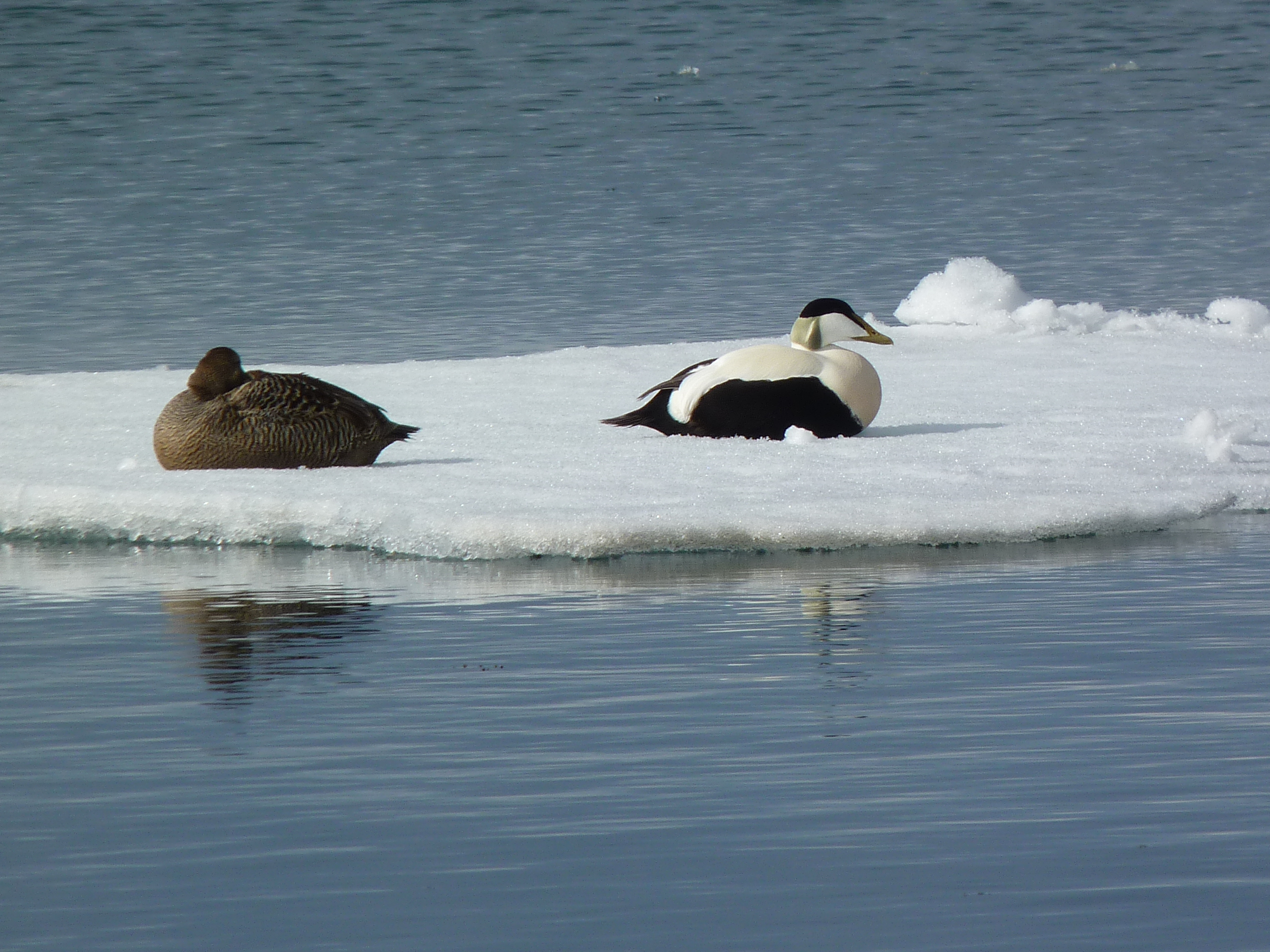
Nothing fake about melting ice. Eiders, off Svalbard (I.Quaile).
This week I came across an interesting publication about to come on to the German market.
“The fossil empire strikes back” (Das fossile Imperium schlägt zurück) is the translation of the catchy title of a new book in German by Professor Claudia Kemfert, head of the department of energy, transportation and environment at the German Institute for Economic Research in Berlin (DIW Berlin,) and professor of energy and sustainability at the Hertie School of Governance, in Berlin.
She has also acted as advisor to the German government, the European Commission and is on the steering committee of the renowned Club of Rome.
A fossil fuels revival: happening now, or alternative facts?
I called her up to record an interview for our Living Planet radio show to find out what was behind the headline, and the sub-title: “why we have to defend the “Energiewende” (energy transition) now.
Prof Kemfert believes the fossil fuels sector is really working hard at making a comeback. That, she says, is not fake news, but the fossils lobby makes use of the latter in its attempt to turn the clock back in terms of energy production.

Kemfert argues for renewables. Copyright: Neuberg, Sebastian Wiegand
While the global transition towards renewable energy has been successful in recent years, with the costs of alternative energies reduced, the Paris Agreement signed and ratified, now, she says, the fossil fuels sector is striking back.
She says they do it by spreading fake news, creating myths about restrictions on cars, speed limits, blackouts, globally, but especially in the USA under the Trump administration. So, she argues, we have to defend the energy transformation. The window of opportunity for climate action is still open, but we are losing time.
The power of fake news
Kemfert’s aim is to debunk the myths, which she is convinced are being used to give renewable energy a bad image. Some of the examples she cited to me are false claims that renewables are more expensive, or that reliance on alternative energies will mean blackouts.
“This has never happened in Germany”, she notes, the country that gave the “Energiewende” its name and pressed ahead with the transition to renewables in recent years.
So how can fake news of this kind make such an impact that Kemfert and other like-minded experts are worried about an oil and coal revival?
“If you repeat this all the time, and repeat it on social media, people think it’s true”, she told me.
“The danger is that they can be successful”.
“The global energy transition is in danger”, she is convinced. “We are losing time to bring greenhouse gases down and help the planet to survive.
“The lobby of the fossil empire is extremely strong… the whole campaign with myths and fake news is really successful, because a lot of people believe what they say”.
So are the fossil fuel lobbyists just better at getting a message across than the other side? There could be something to that, Kemfert agreed. She says the “green lobby” is not aggressive enough. People think “we are the good ones, the energy transition comes by itself”- this is not true. Now it’s time to fight for it”.

We still have a window of opportunity, says Kemfert (Pic. I.Quaile, Alaska)
Time to march?
She calls on all scientists and people who want to protect free and democratic science, to take part in the Marches for Science, planned to take place round the globe on April 22nd.
Of course I wanted to know how she thought the global counter-attack by the “fossil empire” would impact the Arctic.
Yes, she said, this push for a fossil fuels revival could provide additional motivation to those who would like to push ahead with Arctic drilling, as climate change makes for easier and less expensive access:
“There are some aggressive industries, especially coming from the oil and gas sector, who have interest to drill for oil in the Arctic region.
For them, she says, easier access thanks to climate change would be “a nice, so-to-say side effect”.
But for the planet as a whole, climate change is so dangerous that any potential short-time business benefits are just not worth thinking about, says Claudia Kemfert:
“As a climate economist, I cannot say this (oil from the Arctic) makes economic sense, because the costs of climate change are much higher than lower costs, for example, for drilling oil in the Arctic. The costs of global climate change are so high that it cannot outweigh the cost reduction of oil drilling in the Arctic when there’s low ice. We have to move away from oil and gas, this is why it’s more economically efficient to go for an energy transition instead of drilling in areas where we have climate impacts, we are causing environmental difficulties and where we know that burning these fossil fuels will create climate change. That’s really the wrong way to go”.
Kemfert’s book is only being published in German at the moment, but there is more info on her home page, and a longer version of the English interview I conducted with her will be coming up soon on Living Planet and on the DW website.




















Feedback